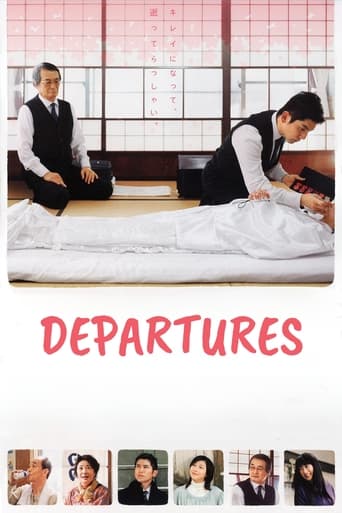



The movie turns out to be a little better than the average. Starting from a romantic formula often seen in the cinema, it ends in the most predictable (and somewhat bland) way.
View MoreIt’s sentimental, ridiculously long and only occasionally funny
View MoreThere's no way I can possibly love it entirely but I just think its ridiculously bad, but enjoyable at the same time.
View MoreWorth seeing just to witness how winsome it is.
I really enjoyed watched the film Departures. This was my favorite film that we have watched this year. This film is about a man named Daigo who quit his passion of playing the cello. Daigo and his wife move back to his hometown in Northern Japan to look for a new living. Daigo finds an ad for a job in which he thinks is a travel agency. Once Daigo was hired, he found out he was actually working as a mortuary. He learns the rituals used in preparing the dead for their final rest. I enjoyed watching this film because it was extremely easy for me to follow, unlike other films I have watched. It is very easy to tell that this film is not American because there is barely any fighting or rivalries. I did not like the beginning of this film because the start of it was a very slow pace. The more I watched this film, the better it got. My favorite part of this film is how the main character, Daigo quits his one and only passion to find a new one. I was expecting that Daigo would have different life because he quits what he loves the most. I like how the director displayed Daigo's character to be bold and willing try new things even if he fails.
View More"Departures" follows the life of Daido Kobayashi, a washed up cellist that attempts to find a new job and life back in his hometown. Little does Daido know, that when he discovers an ad for an opening at a departure agency that will change help him discover his real passion. Written by Kundo Koyama and directed by Yojiro Takita, "Departures" connects with the audience on a level that is very much opposite of its actions in the feature. The departure job that Daido ends up accepting is not for a travel agency like he and others thought, but instead, it is a funeral business that prepares the dead for their loved one's families and attempts to help the deceased, peacefully pass over into the next life. At the same time, we watch the arguments and solutions that occur between Daido and his wife Mika, as everyone encourages him to quit his job and peruse the passion of playing the cello in an orchestra. Overall, the movie "Departures" is a great example of what some Buddhist believe and how they treat the afterlife, as well as keeping a sense of entertainment through the journey of the protagonist searching for his true self instead of the self that is given to him by others or even the one that he thinks is the correct path. At its base, this movie shows the audience what it looks like to discover and pursue a person's authentic self that builds a level of identity that is real, true, genuine, inside of each one of us, and although it can change it is truly who you are at the core, and more importantly it is the one thing that separates everyone from each other because you are uniquely yours.
View MoreIt's very surprising to see a movie about the taboo practice of encoffinment, become so university praise by critics. You would think, this movie would, fall under the radar of American & Japanese society, because of the dark subject matter; however, this movie became one of the highest-grossing domestic Japanese films of that year. It was even, a bigger hit international abroad; winning many awards from critics like the Academy Award for Best Foreign Film of 2009. However, for me, I saw it as a one-time watch. A good movie worth checking out, but not worth revisiting, time after time, again. Loosely based on 'Coffinman', a memoir by Shinmon Aoki, and originally titled "Okuribito" means "the sending away"; Departures follows the story of a young man, Kobayashi Daigo (Masahiro Motoki) who returns to his hometown after a failed career as a cellist and stumbles across work as a nōkanshi—a traditional Japanese ritual mortician. He is subjected to prejudice from those around him, including from his family and friends, because of strong social taboos against people who deal with death. Eventually he must try to earn their respect and learns the importance of interpersonal connections through the beauty and dignity of his work. Can Kobayashi Daigo achieve that or will he be disconnect from his family & friends for the rest of his life? Watch the movie to find out, if you want to! Without spoiling the movie, too much, I have to say, this movie by director Takita Yojiro was very informative to how Japanese culture prepare their dead for the afterlife. This is pretty much, the main appeal of the film for me. To see, what steps, it takes for them to prepare their dead is very interesting; and I'm not known for having a morbid curiosity for such things. You really do learn, a lot about Japanese culture, by watching this. However, besides those, the movie doesn't have much, going for itself. Yes, the classical cello music by composer Joe Hisaishi was indeed beautiful to hear and some of the film is very well-shot, but as a main stream appeal; it doesn't really have some. It's morbid curiosity at its best. I really don't know, if American audiences would revisited this film, time after time, again like me. After all, the film moves in a somewhat slow, heavy-handed, and predictable pace. In my opinion, the conventional simple story is a little too-stretch out. The result of this, cause the movie to falls into a pit full of pointless filler scenes in the second act. Even, the third act, break up is very clichés. You can see it, coming from a mile away. However, most of the changes from the novel, in the climax for the film, was well-written and perform. I love the ending with the message stone. It was somewhat redeeming and heart-warming. As much, as it's sounding like, I didn't like the movie, I honestly did love it. The actors in the film are all, well-played. One thing, I'm pretty glad, the movie has, is English subtitles then English dubbing, because I would hate to see the movie suffer from bad lip sync. The subtitles really help a lot, because some of these rituals can seem somewhat confusing. After all, there are not many people that eat live squids, go to bath houses and drink Japanese tea in rituals ceremony, here in the States. It was nice to try to understand, such practices. I also kinda glad, the movie had some lighten moments. A good example is when Kobayashi and his boss, Sasaki (Tsutomu Yamazaki) are cleaning a body that they thought was a woman, but they find out, it's a man. However, one thing, worth noticing, about Japanese humor is how that joke and many after that, doesn't have that much of a punch-line, because the film tries too hard to be respectful. I think, this film would work, better, if they allow more leeway in how they were able to portray the dead. Maybe there was a little too much calming, hypnotic grace with this PG-13 film. It mask people's fears, too much that humor and drama can't really shine through. I think this is why, the movie kinda suffers, when it comes to rewatch value. Maybe, it could had work better, as an R-Rated film, but that's just a maybe. Anyways; Overall: Departures is alright movie. Somewhat overpraise, but still a great film worth checking out. After all, it's nice to see films like this, reverse prejudice against a once taboo subject.
View MoreA well written movie, which touches many themes most importantly dealing with death and watching others grief upon it. One side of it is very soft and touches our heart but on the other hand it is not as astonishing as we expect it to be. Story and even scenes are very predictable. Ending also could be seen from minutes away from it. Director has worked hard on the interior of Coffining but failed to bring deeper sentiments onto screen. Tsutomu Yamazaki's portrayal of a Boss who teaches the protagonist is the most fabulous quality of the movie. Actor actually work the role around and inside. Masahiro Motoki and Ryōko Hirosue are very convincing although camera sometime focused on Ryōko more then it needed. Her character as a devoted wife is well however it is not explored much. Ritual of coffining are filmed very good. The sub plot of protagonist's relation with his father was good but there could have been more about it. Over all a light hearted sentimental film.
View More